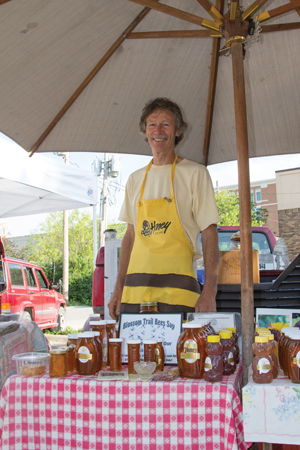| 2014 Q2 | story by LIZ WESLANDER | photos by STEVEN HERTZOG |

Blossom Trail Bee Ranch
Richard Bean has been working with bees since the Nixon era. That may seem like a long time to some, but Richard reckons that 40 years is a relatively short amount of time when you consider the significant amount of changes he has seen during his beekeeping career.
“You used to be able to look at a hive that had died and know what had happened,” says Richard. “Now, there are so many things going on that you look at the hive, and you shake your head because you don’t know what happened.”
Richard attributes the challenge of maintaining healthy bees to changes in climate and to an increase in non-native beetles and mites that decimate hives. That said, Richard does not use pesticides or herbicides on any part of his 5-acre Blossom Trail Bee Ranch in Baldwin City. Instead, he chooses to focus on careful maintenance of his 60 honey-producing bee colonies. This includes removing pests by hand and adding a new queen to colony when one goes missing.

Richard Bean
“Beyond that, If the bees are going to make it, they are going to make it on their own,” says Richard “I don’t see the long- term benefit of using something that they can’t manufacture on their own.”
Richard sells honey from his bees – along with eggs and produce from his farm- at the Lawrence Farmers Market. Both Lawrence HyVees also carry Blossom Trail Bee Ranch honey. While honey may be his bread and butter, it is safe to say that Richard’s higher calling is breeding healthy bee colonies and teaching the increasingly challenging art of beekeeping to people interested in maintaining their own hives.
“Interest has increased,” says Richard. “People are much more aware of the situation that honeybees are in and I’m only glad for that. I feel like I’m fulfilling a need.”
Richard is quick to clarify that although a lot of people show an interest in beekeeping, the number of people who are actually up to the task is limited.
“It’s not just setting up a hive and checking it a few times summer,” says Bean. “You have to be mindful of the colonies and look at them regularly to see how they are doing. There’s a lot to know and a lot to do – so many things that keep you on your toes.

35 Comments
cialis for daily use side effects: TadalAccess – online cialis australia
cialis at canadian pharmacy tadalafil generic 20 mg ebay generic cialis 5mg
https://tadalaccess.com/# cialis dapoxetine australia
where to get free samples of cialis Tadal Access when will cialis become generic
https://tadalaccess.com/# where to buy cialis online for cheap
how well does cialis work: Tadal Access – cialis 40 mg reviews
cialis daily side effects tadalafil 20 mg directions tadalafil tamsulosin combination
maximpeptide tadalafil review: cialis maximum dose – cialis 20mg price
cialis black review cialis australia online shopping buy cipla tadalafil
https://tadalaccess.com/# canadian pharmacy generic cialis
buy cialis overnight shipping purchase generic cialis cialis 100 mg usa
https://tadalaccess.com/# cialis tadalafil 20mg kaufen
cialis patent expiration: TadalAccess – cialis priligy online australia
tadalafil review cialis manufacturer coupon free trial where to get free samples of cialis
cialis alcohol buy cialis no prescription australia tadalafil tablets
https://tadalaccess.com/# cialis walgreens
https://tadalaccess.com/# liquid tadalafil research chemical
tadalafil best price 20 mg: sunrise pharmaceutical tadalafil – tadacip tadalafil
buy cialis no prescription Tadal Access cialis price per pill
cialis no perscription overnight delivery TadalAccess canadian pharmacy cialis 20mg
https://tadalaccess.com/# cialis and dapoxetime tabs in usa
vardenafil and tadalafil: buy cialis generic online 10 mg – cialis free trial voucher
https://tadalaccess.com/# cialis discount coupons
what is the generic name for cialis tadalafil generic usa cialis tadalafil 20mg kaufen
cialis meme Tadal Access where can i get cialis
mantra 10 tadalafil tablets: what is the use of tadalafil tablets – buy cialis online safely
https://tadalaccess.com/# snorting cialis
how long does it take for cialis to start working Tadal Access what happens when you mix cialis with grapefruit?
https://tadalaccess.com/# cialis 5mg daily how long before it works
cheap t jet 60 cialis online how long before sex should i take cialis cialis from india online pharmacy
sildenafil vs tadalafil which is better: where can i buy cialis online in canada – cialis tadalafil 20mg kaufen
cialis manufacturer coupon Tadal Access buy tadalafil cheap online
https://tadalaccess.com/# cialis 5 mg price
cialis 800 black canada buy generic tadalafil online cheap cialis 20mg side effects
https://tadalaccess.com/# buying cialis generic